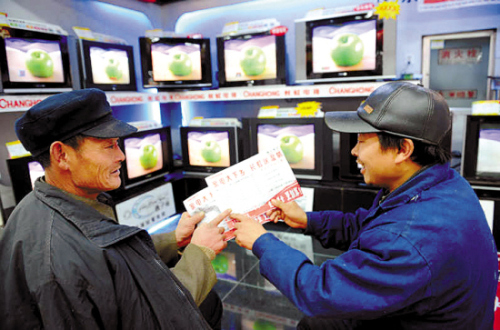 The policy of home appliances going to the countryside is about to expire. At present, the Ministry of Industry and Information Technology is brewing a new policy of supporting appliances. The policy of home appliances going to the countryside started from several trials in 2007 to the full rollout, and then expired in January 2013. It has played an important role in the popularization or replacement of home appliances in the rural market. While seeing the good side, it is also necessary to admit that the home appliances to the countryside policy has become meaningless for home appliance companies. The policy is exhausted.
The policy of home appliances going to the countryside is about to expire. At present, the Ministry of Industry and Information Technology is brewing a new policy of supporting appliances. The policy of home appliances going to the countryside started from several trials in 2007 to the full rollout, and then expired in January 2013. It has played an important role in the popularization or replacement of home appliances in the rural market. While seeing the good side, it is also necessary to admit that the home appliances to the countryside policy has become meaningless for home appliance companies. The policy is exhausted. According to Zhuo Chuang's research, several mainstream home appliance companies are opposed to the extension of this policy. The reasons are nothing more than the following: First of all, the implementation of the home appliances to the countryside policy has been partially overdrawn in the consumption capacity of the rural market in the past few years. Due to the characteristics of home appliances and the consumption habits of rural consumers, it is impossible to conduct home appliances in the short term. Second upgrade. At present, the demand for large appliances in rural areas has shrunk. Therefore, some mainstream household appliance manufacturers have already consciously controlled the market size of their products in the countryside.
The bottom-level distributors' consideration of their own interests and the negative attitude towards the sales of home appliances to the countryside have also become a reason for the weakness of the home appliances to the countryside.
The competitiveness of the rural model is worse than before, the bottom dealers are not optimistic about the sales prospects of home appliances to the countryside; together with the expiry of the home appliances to the countryside policy, the dealers also worry about long-term occupation of inventory after purchase, in the home appliances to the countryside. After the end of the policy, they cannot receive the subsidy and are therefore less willing to purchase goods. In addition, the overly complicated subsidy process also affected the sales of home appliances in the countryside. As a result of the benefits, dealers are more inclined to profitable non-subsidized models.
At present, the attitude of mainstream home appliance manufacturers is very noteworthy. It is reported that although the mainstream home appliance manufacturers have affirmed the effectiveness of the home appliances to the countryside policy, but in September this year, the Ministry of Industry and Information Technology organizes enterprises to discuss the extension of home appliances to the countryside policy, including Haier, Hisense, Midea, Gree and other mainstream home appliance manufacturers All expressed opposition. Therefore, Zhuochuang believes that although the policy looks beautiful, the effect is very general. It is expected that delaying the policy may not bring great benefits to the entire household appliance industry. Instead, some second- and third-tier brands should have been strategically upgraded in the industry. The products that should be eliminated in the rural market are rekindled and will not be conducive to the development of the industry in the long run.
Guangzhou Yunge Tianhong Electronic Technology Co., Ltd , http://www.e-cigaretteyfactory.com